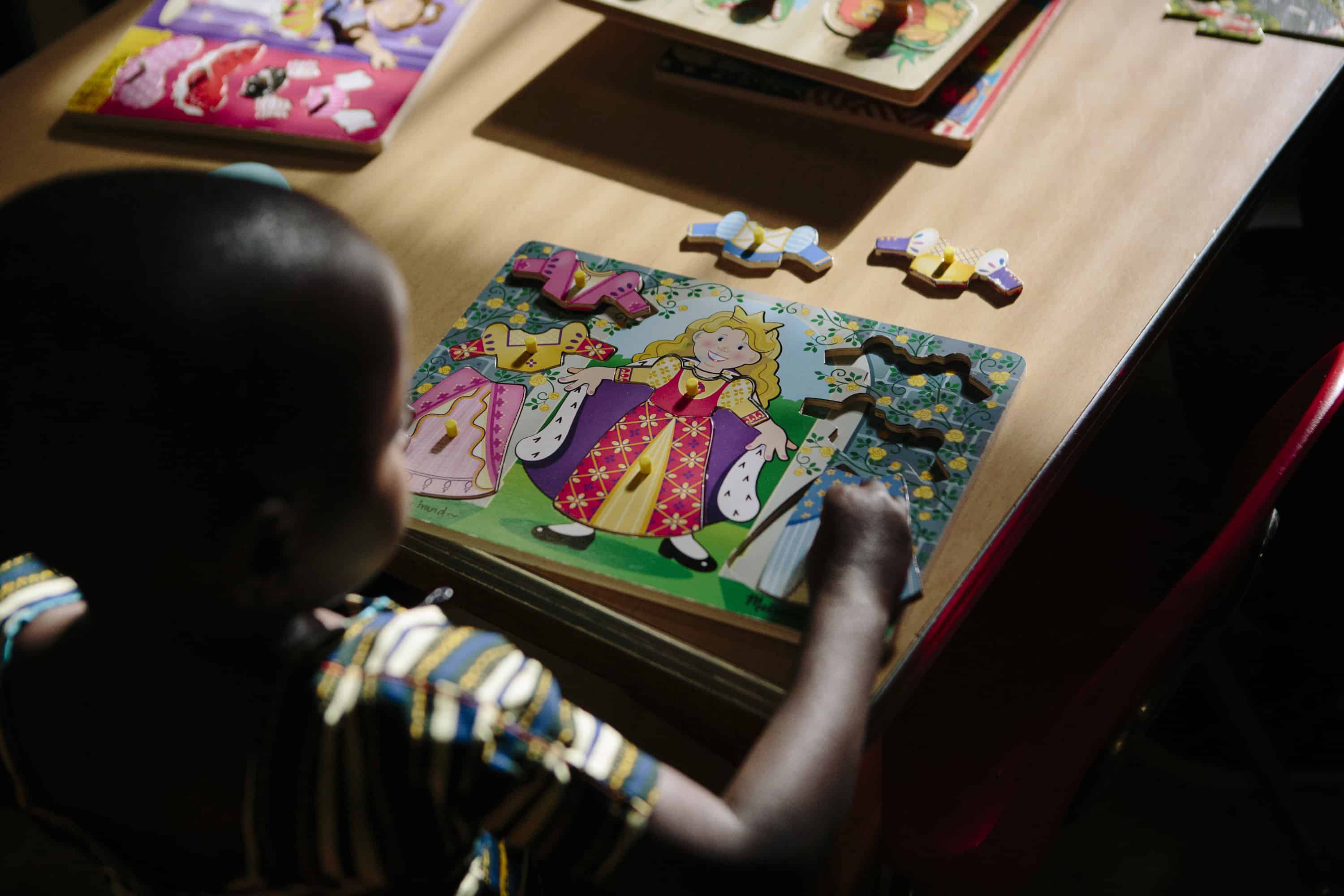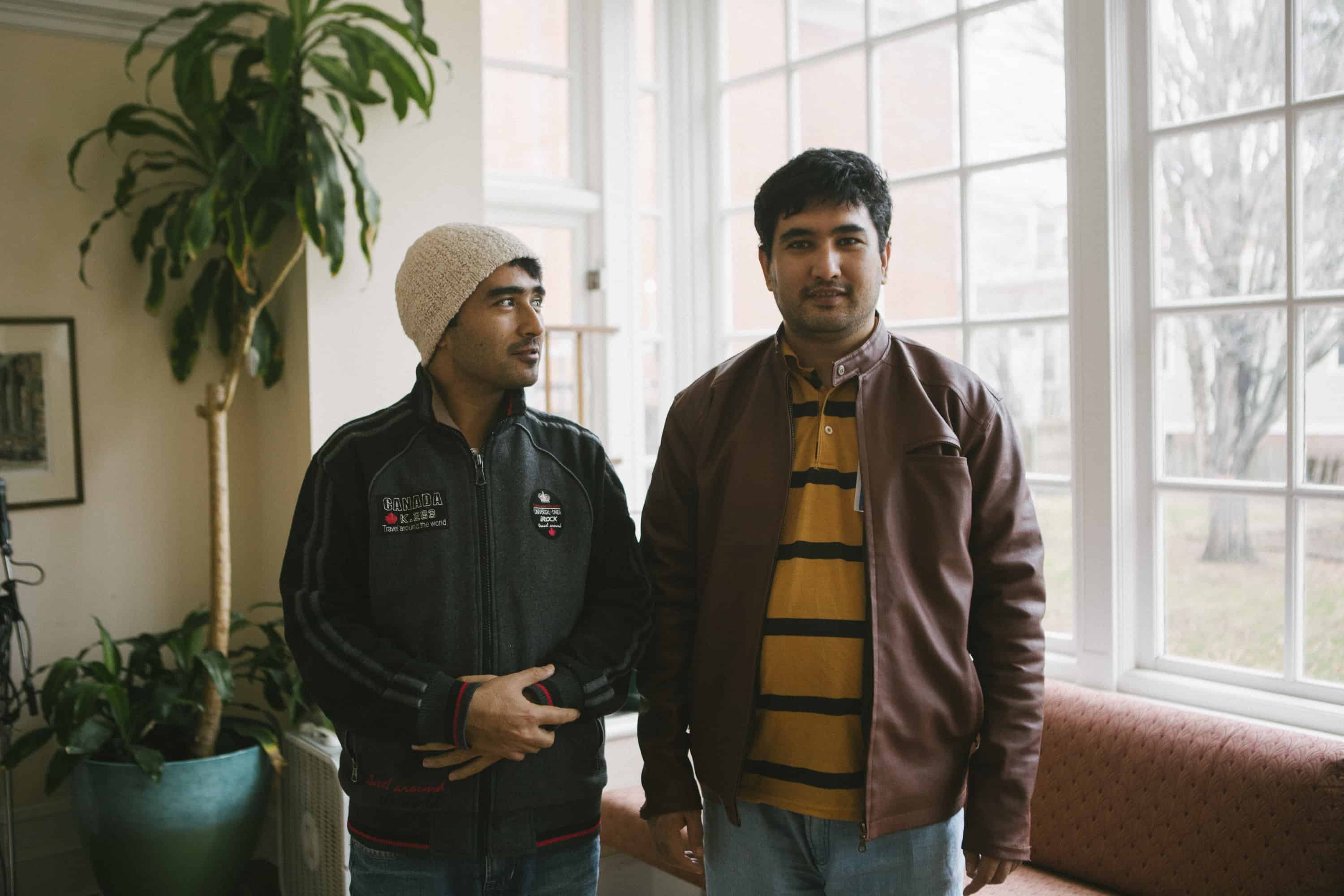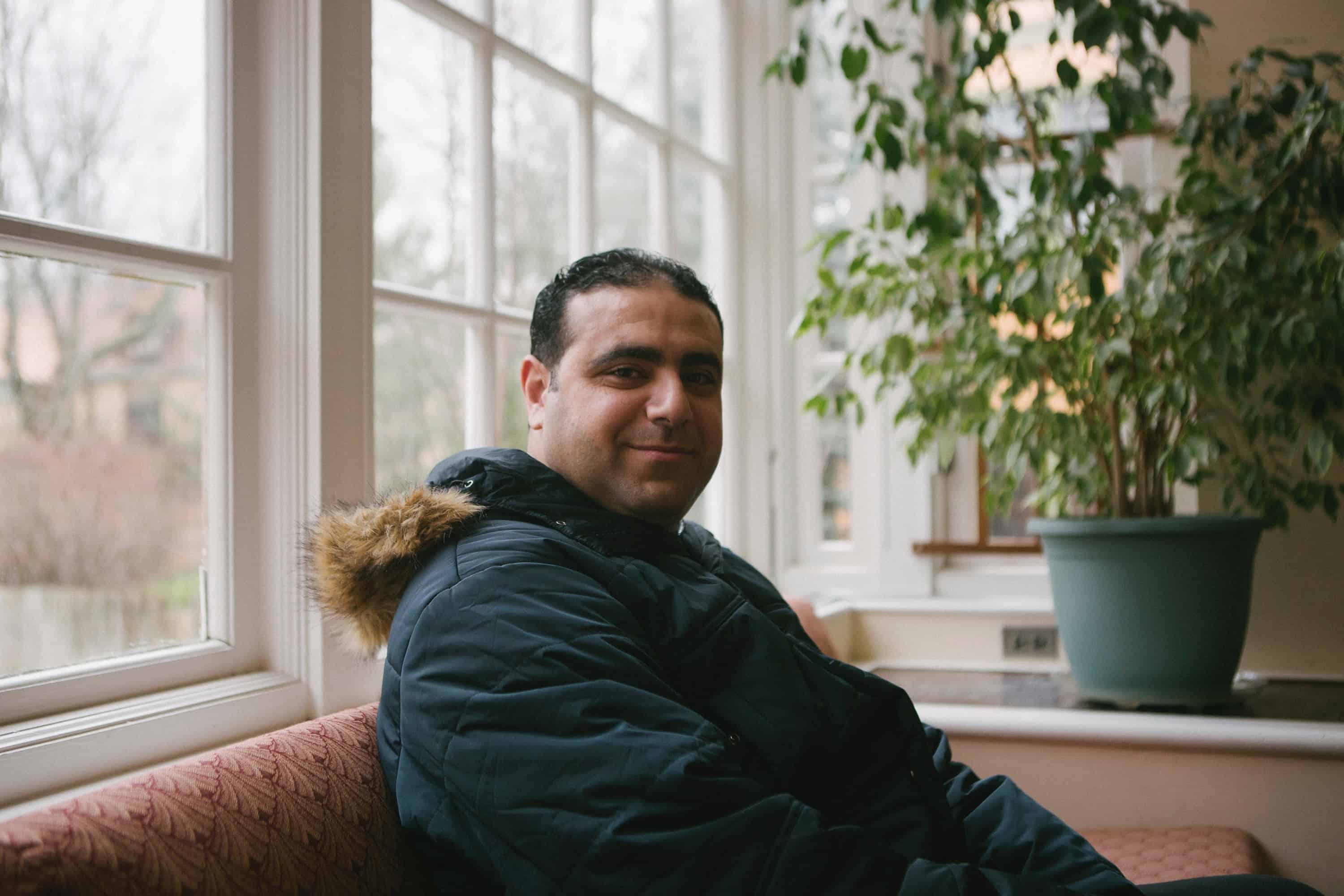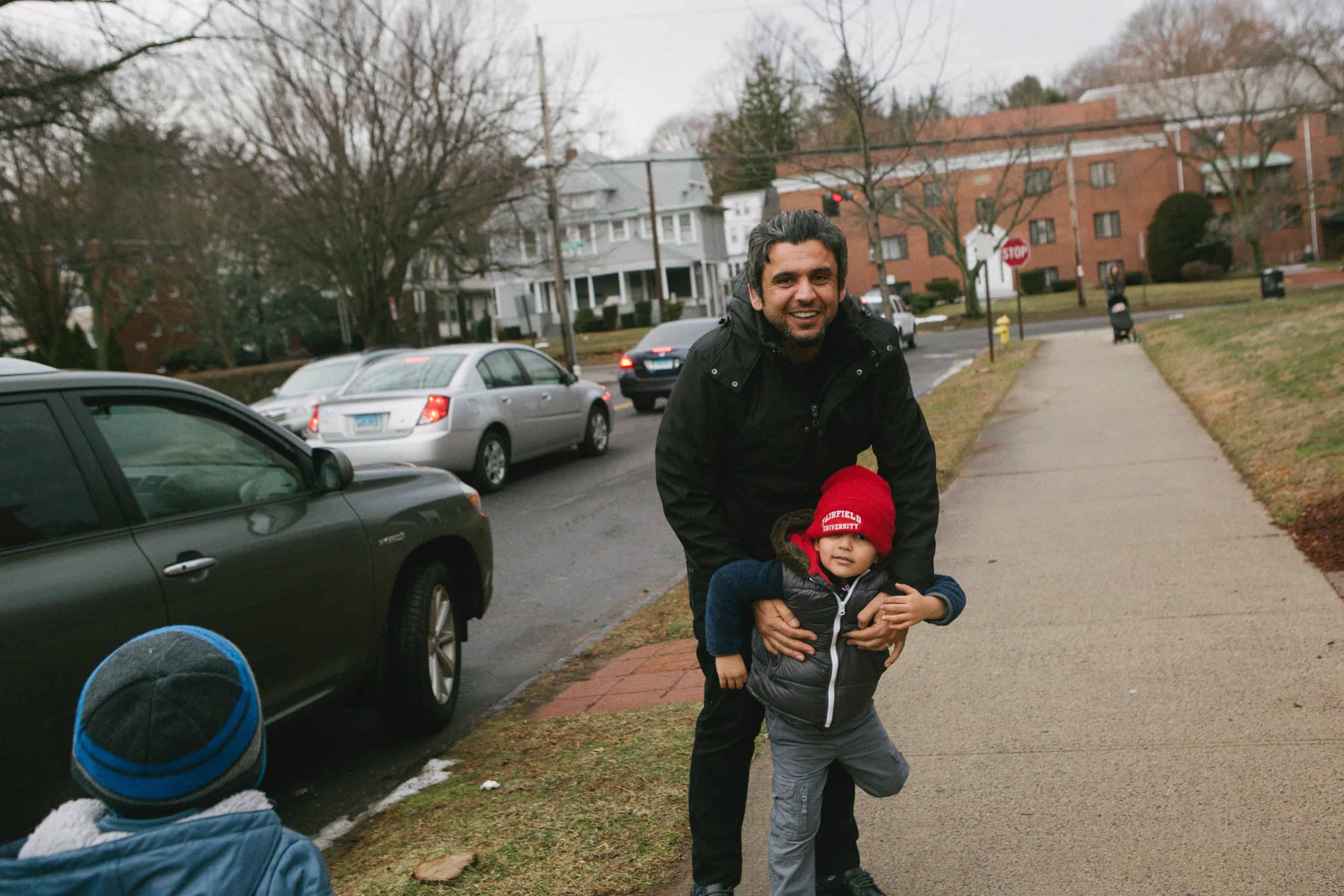NEW HAVEN, Connecticut — In the basement of a stately, high-ceilinged church here earlier this month, a class for newly arrived refugees was momentarily interrupted by a young boy dressed in a Christmas-colored elf costume and a girl in a princess dress who’d run in chasing after him. Both were after their mother, who was seated among other Afghan and Iraqi women attending the daylong crash course on American laws, culture, and local logistics. It would be one of the last refugee orientations conducted in the U.S. for some time.Roughly 50 men, women, and children from a half-dozen countries sat at small, round classroom tables to take in the spectacle of resettlement professionals and volunteers role-playing various aspects of American life. Instructors offered advice on how to properly handle domestic arguments before they turned violent, everyday interactions with pharmacists, and diet and exercise. Down the hall, children played with blocks and puzzles and other toys. “In America, this is how we do things,” Chris George, the director of New Haven’s Integrated Refugee and Immigrant Services resettlement program, said to the class, “and you’re all Americans now.” It was as much a welcoming embrace as the kind of carefully constructed warning worried parents are prone to using: Listen to me; it’s for your own good.George paused while translators at each table delivered his declarative statement to refugees from Eritrea, Ethiopia, Congo, Somalia, Iraq, Afghanistan, and Syria; a wave of smiles and laughter soon followed. Upon arriving in the United States, resettlement workers like George and his colleagues are usually a refugee’s lifeline, coach, and first phone call, providing them with crucial support and guidance on their way to self-sufficiency.George pointed to one table of men in the back that didn’t need a translator because they all spoke English — he referred to them as the “Afghan dads.” Before becoming refugees, many of them had worked on U.S. bases alongside military men and women, he said, cooking them food, cleaning their quarters, and in some cases providing translation services. Two of the men, brothers Farhad and Ali, had fled Afghanistan five years ago and had arrived in the U.S. after spending nearly as long under asylum in Indonesia.
“In America, this is how we do things,” Chris George, the director of New Haven’s Integrated Refugee and Immigrant Services resettlement program, said to the class, “and you’re all Americans now.” It was as much a welcoming embrace as the kind of carefully constructed warning worried parents are prone to using: Listen to me; it’s for your own good.George paused while translators at each table delivered his declarative statement to refugees from Eritrea, Ethiopia, Congo, Somalia, Iraq, Afghanistan, and Syria; a wave of smiles and laughter soon followed. Upon arriving in the United States, resettlement workers like George and his colleagues are usually a refugee’s lifeline, coach, and first phone call, providing them with crucial support and guidance on their way to self-sufficiency.George pointed to one table of men in the back that didn’t need a translator because they all spoke English — he referred to them as the “Afghan dads.” Before becoming refugees, many of them had worked on U.S. bases alongside military men and women, he said, cooking them food, cleaning their quarters, and in some cases providing translation services. Two of the men, brothers Farhad and Ali, had fled Afghanistan five years ago and had arrived in the U.S. after spending nearly as long under asylum in Indonesia. During a 15-minute food and bathroom break, George walked around the room like a town mayor. But he grew serious when asked whether he thought he might be teaching some of the last refugees that would enter the country in 2017.In recent months, George, ever an optimist, had grown worried about the safety of the program and the people to whom he’d committed the last 11 years of his life. He was spending more and more of his time responding to his clients’ growing but still abstract fears of Donald Trump, the anti-refugee rhetoric he regularly espoused, and the future he might create for them. George said these orientations, typically reserved for basic introductory lessons to American life, had come to include something new: a course on what to do when confronted by hate, and how to report such incidents.
During a 15-minute food and bathroom break, George walked around the room like a town mayor. But he grew serious when asked whether he thought he might be teaching some of the last refugees that would enter the country in 2017.In recent months, George, ever an optimist, had grown worried about the safety of the program and the people to whom he’d committed the last 11 years of his life. He was spending more and more of his time responding to his clients’ growing but still abstract fears of Donald Trump, the anti-refugee rhetoric he regularly espoused, and the future he might create for them. George said these orientations, typically reserved for basic introductory lessons to American life, had come to include something new: a course on what to do when confronted by hate, and how to report such incidents. The country was still a week away from Trump’s inauguration and no one working inside IRIS’s overstuffed offices could know how quickly he would move to freeze all U.S. resettlement operations and suspend Syrian resettlement indefinitely. The refugees in their care had more immediate concerns: learning English, taking their children to doctor’s appointments, and finding jobs.Amid the flurry of acclimating to their new life, most of the refugees had come to accept two hard facts: that America was supposed to be their final stop after years of impermanence, and that their families and lives as they knew them might never be the same again.Mohammed Chaghlil was coming to terms with both realities at once. He was trying to look forward to his future in America after years of loss and displacement but was finding it difficult while the status of his mother’s asylum application remained uncertain. He’d lost his home and business in Damascus and seen his family fractured beyond recognition — his siblings were now scattered in the countries surrounding Syria. But after arriving in the U.S. in late December, he was feeling hopeful.“There’s one phrase that is just great: ‘Welcome to America.’ It’s a really great phrase; it gives you such a good feeling,” he said.
The country was still a week away from Trump’s inauguration and no one working inside IRIS’s overstuffed offices could know how quickly he would move to freeze all U.S. resettlement operations and suspend Syrian resettlement indefinitely. The refugees in their care had more immediate concerns: learning English, taking their children to doctor’s appointments, and finding jobs.Amid the flurry of acclimating to their new life, most of the refugees had come to accept two hard facts: that America was supposed to be their final stop after years of impermanence, and that their families and lives as they knew them might never be the same again.Mohammed Chaghlil was coming to terms with both realities at once. He was trying to look forward to his future in America after years of loss and displacement but was finding it difficult while the status of his mother’s asylum application remained uncertain. He’d lost his home and business in Damascus and seen his family fractured beyond recognition — his siblings were now scattered in the countries surrounding Syria. But after arriving in the U.S. in late December, he was feeling hopeful.“There’s one phrase that is just great: ‘Welcome to America.’ It’s a really great phrase; it gives you such a good feeling,” he said. George was proud of the community response to incoming refugees he’d seen over the last year. “I just wish something like this was happening in every state and then there would be a real groundswell, a real grassroots pushback” when Trump finally made good on his campaign promises.Other refugee resettlement workers around the country reported similar experiences: the more Trump threatened refugees the more local communities got engaged, offered money, and asked how they could help. In Connecticut, IRIS had pioneered its community co-sponsorship model that invites local townships, faith-based groups, and volunteers to come together and sponsor a refugee on their own.As the class came to a close, some of these volunteers trickled into the room like parents waiting for an afterschool program’s merciful end. They had driven from all over the state to pick up newly arrived refugees and ferry them to grocery stores, doctor’s appointments, or simply back to their homes.
George was proud of the community response to incoming refugees he’d seen over the last year. “I just wish something like this was happening in every state and then there would be a real groundswell, a real grassroots pushback” when Trump finally made good on his campaign promises.Other refugee resettlement workers around the country reported similar experiences: the more Trump threatened refugees the more local communities got engaged, offered money, and asked how they could help. In Connecticut, IRIS had pioneered its community co-sponsorship model that invites local townships, faith-based groups, and volunteers to come together and sponsor a refugee on their own.As the class came to a close, some of these volunteers trickled into the room like parents waiting for an afterschool program’s merciful end. They had driven from all over the state to pick up newly arrived refugees and ferry them to grocery stores, doctor’s appointments, or simply back to their homes. Housain Solomon, a former lab technician who escaped Aleppo with his wife and two children in 2011, held his orientation completion certificate with a sense of relief. After fleeing from city to city within Syria and waiting another three years in Turkey for his family’s asylum application to process, he finally felt he’d reached the end of his journey when he stepped foot in America in December.As a Syrian, he said he’d long ago accepted the possibility of a divide between a country’s government and its people, but he’d been watching the news (he was one of the few refugees to speak Trump’s name), and he was afraid of what would happen when he arrived in the U.S. Now that he was here, with an entire local community involved in his family’s resettlement, he had shed his previously jaded political outlook. Instead he was trying to reconcile something else: How America’s people could be so kind, but its politics so cruel.
Housain Solomon, a former lab technician who escaped Aleppo with his wife and two children in 2011, held his orientation completion certificate with a sense of relief. After fleeing from city to city within Syria and waiting another three years in Turkey for his family’s asylum application to process, he finally felt he’d reached the end of his journey when he stepped foot in America in December.As a Syrian, he said he’d long ago accepted the possibility of a divide between a country’s government and its people, but he’d been watching the news (he was one of the few refugees to speak Trump’s name), and he was afraid of what would happen when he arrived in the U.S. Now that he was here, with an entire local community involved in his family’s resettlement, he had shed his previously jaded political outlook. Instead he was trying to reconcile something else: How America’s people could be so kind, but its politics so cruel.
Advertisement

Advertisement


Advertisement

